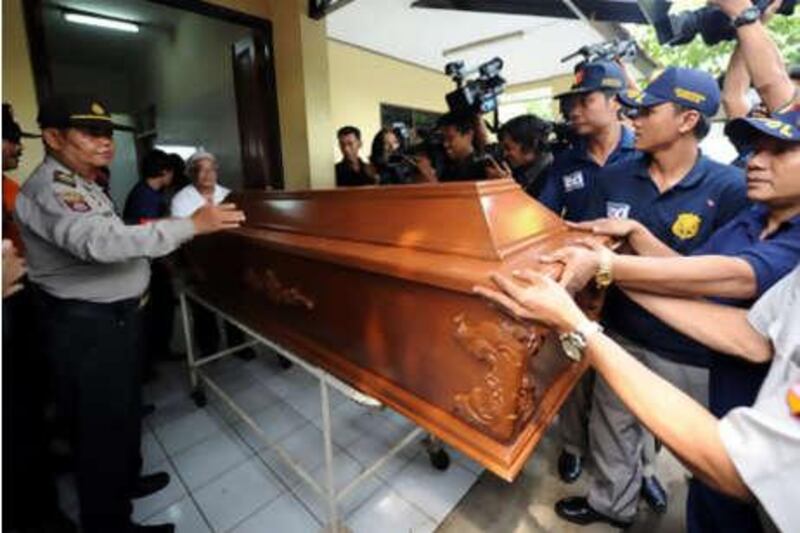JAKARTA, INDONESIA // Indonesia's elite anti-terror squad arrested the country's most-wanted man and two of his aides in a series of coordinated raids on Java island, police said. Another suspected militant was killed the shootout. Abdullah Sunata is accused of helping set up a network that was reportedly plotting a Mumbai-style attack targeting foreigners at luxury hotels in the capital, Jakarta, and several high-profile assassinations, including president Susilo Bambang Yudhoyono.
He jumped to the top of the fugitive list following the deaths of Nordin M Top and Dulmatin, who both died at the hands of police in the last year. "We have successfully arrested Sunata and two other suspects," national police spokesman Maj Gen Edward Aritonang said after a raid on their rented home in Cungkrungan, a village in Central Java province late Wednesday. They found a bomb in a backpack and several revolvers.
An earlier raid on a house in nearby Girimulya village also yielded explosives and weapons. Police could not immediately confirm a report on Metro TV that said documents discovered during one of the sieges indicated the men were planning an attack on the Danish embassy in Jakarta.
The country of 240 million has battled militants with links to the Southeast Asian network, Jemaah Islamiyah, since 2002, when extremists bombed a nightclub district on Bali island, killing 202 people, most of them foreign tourists. There have been three other major suicide bombings since then, the most recent targeting two luxury hotels in Jakarta a year ago killing seven. Though hundreds of suspected militants have been captured or killed in a security clampdown in recent years, terrorists have proved to be a resilient foe, with networks splintering and mutating.
Sunata's new cell, uncovered in February in westernmost Aceh province, was comprised of militants from several different groups. Authorities discovered their jihadi training camp and found a cache of M-16 assault rifles, revolvers and thousands of rounds of ammunition. At least 60 suspected members of that network have been arrested in recent months. Another 13 have been killed, prompting some critics to say valuable intelligence was being lost.
Ken Conboy, a Jakarta-based expert on Southeast Asian terrorist groups, said the arrest of Sunata was significant. "He'd be able to connect a lot of the dots about the Aceh operations," from funding and training to potential targets, he said. "What were these guys going to be used for?" Sunata was sentenced to seven years in prison in 2006 for hiding Top, an expert bomb-maker who once headed Jemaah Islamiyah. He was released in April 2009 for good behaviour, but returned to the terrorist network.
*AP





